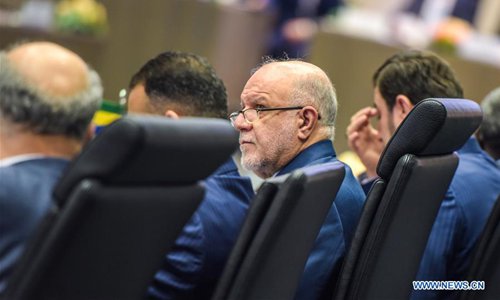HOME >> WORLD
Russia ready to coordinate cooperation, stabilize oil markets: Kremlin
Source:Reuters Published: 2020/4/6 20:13:40
Saudi Arabia and Russia are close to a deal on oil output cuts to reduce a global glut, a top Russian oil negotiator said on Monday, but details such as how to sort out production curbs remained unclear ahead of talks planned for later this week.

Riyadh and Moscow blamed each other for the failure and launched a battle for a market share, sending oil prices to their lowest in two decades that has strained budgets of oil producing nations and hurt higher-cost producers in the United States.
US President Donald Trump said last week he had brokered a deal with Moscow and Riyadh. But initial plans for an OPEC+ meeting on Monday were delayed, with two OPEC sources saying a video conference would now be held at 1400 GMT on Thursday.
"I think the whole market understands that this deal is important and it will bring lots of stability, so much important stability to the market, and we are very close," Kirill Dmitriev, one of Moscow's top oil negotiators who also heads Russia's sovereign wealth fund, told CNBC.
Dmitriev was the first to make a public declaration last month about the need for an enlarged supply pact, potentially involving producers outside the OPEC+ group.
Trump has said a deal could see cuts of 10 percent to 15 percent of global supply, although analysts say even such a huge reduction would still not solve the immediate problem of oversupply which by some estimates has crashed by 20 percent to 30 percent.

Iranian Minister of Petroleum Bijan Namdar Zangeneh (C) attends the 6th Organization of the Petroleum Exporting Countries (OPEC) and non-OPEC Ministerial Meeting in Vienna, Austria, July 2, 2019. Ten non-OPEC oil producing countries led by Russia endorsed on Tuesday the decision by the OPEC to extend production cuts until next March. Photo: Xinhua
A supply deal between OPEC, Russia and other producers, a group known as OPEC+, that had propped up oil prices for three years collapsed in March, while the coronavirus hammered demand.Riyadh and Moscow blamed each other for the failure and launched a battle for a market share, sending oil prices to their lowest in two decades that has strained budgets of oil producing nations and hurt higher-cost producers in the United States.
US President Donald Trump said last week he had brokered a deal with Moscow and Riyadh. But initial plans for an OPEC+ meeting on Monday were delayed, with two OPEC sources saying a video conference would now be held at 1400 GMT on Thursday.
"I think the whole market understands that this deal is important and it will bring lots of stability, so much important stability to the market, and we are very close," Kirill Dmitriev, one of Moscow's top oil negotiators who also heads Russia's sovereign wealth fund, told CNBC.
Dmitriev was the first to make a public declaration last month about the need for an enlarged supply pact, potentially involving producers outside the OPEC+ group.
Trump has said a deal could see cuts of 10 percent to 15 percent of global supply, although analysts say even such a huge reduction would still not solve the immediate problem of oversupply which by some estimates has crashed by 20 percent to 30 percent.